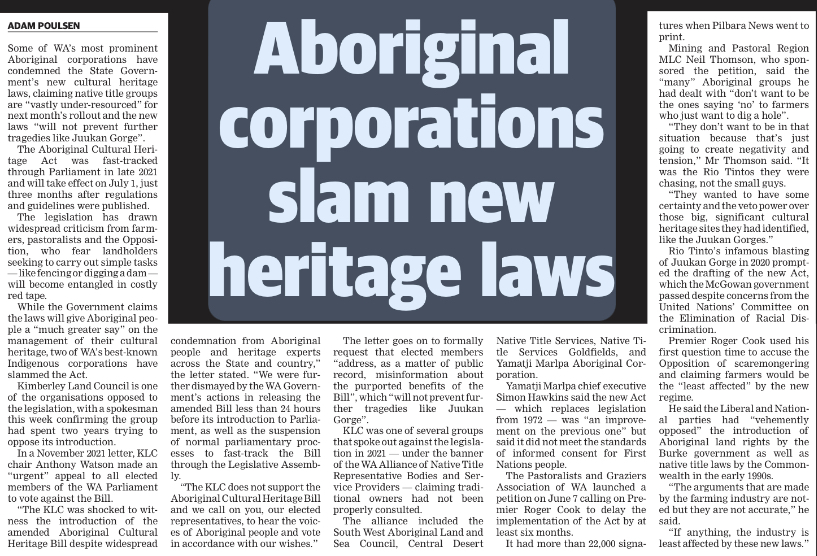

Article by Adam Poulson courtesy of the West Australian.
Some of WA’s most prominent Aboriginal corporations have condemned the State Government’s new cultural heritage laws, claiming native title groups are “vastly under-resourced” for next month’s rollout and the new laws “will not prevent further tragedies like Juukan Gorge”.
The Aboriginal Cultural Heritage Act was fast-tracked through Parliament in late 2021 and will take effect on July 1, just three months after regulations and guidelines were published.
The legislation has drawn widespread criticism from farmers , pastoralists and the Opposition , who fear landholders seeking to carry out simple tasks — like fencing or digging a dam — will become entangled in costly red tape.
While the Government claims the laws will give Aboriginal people a “much greater say” on the management of their cultural heritage, two of WA’s best-known Indigenous corporations have slammed the Act.
Kimberley Land Council is one of the organisations opposed to the legislation, with a spokesman this week confirming the group had spent two years trying to oppose its introduction.
In a November 2021 letter, KLC chair Anthony Watson made an “urgent” appeal to all elected members of the WA Parliament to vote against the Bill.
“The KLC was shocked to witness the introduction of the amended Aboriginal Cultural Heritage Bill despite widespread condemnation from Aboriginal people and heritage experts across the State and country,” the letter stated.
“We were further dismayed by the WA Government’s actions in releasing the amended Bill less than 24 hours before its introduction to Parliament, as well as the suspension of normal parliamentary processes to fast-track the Bill through the Legislative Assembly.
“The KLC does not support the Aboriginal Cultural Heritage Bill and we call on you, our elected representatives, to hear the voices of Aboriginal people and vote in accordance with our wishes.”
The letter goes on to formally request that elected members “address, as a matter of public record, misinformation about the purported benefits of the Bill”, which “will not prevent further tragedies like Juukan Gorge”.
KLC was one of several groups that spoke out against the legislation in 2021 — under the banner of the WA Alliance of Native Title Representative Bodies and Service Providers — claiming traditional owners had not been properly consulted.
The alliance included the South West Aboriginal Land and Sea Council, Central Desert Native Title Services, Native Title Services Goldfields, and Yamatji Marlpa Aboriginal Corporation.
Yamatji Marlpa chief executive Simon Hawkins said the new Act — which replaces legislation from 1972 — was “an improvement on the previous one” but said it did not meet the standards of informed consent for First Nations people.
The Pastoralists and Graziers Association of WA launched a petition on June 7 calling on Premier Roger Cook to delay the implementation of the Act by at least six months.
It had more than 22,000 signatures when Pilbara News went to print.
Mining and Pastoral Region MLC Neil Thomson, who sponsored the petition, said the “many” Aboriginal groups he had dealt with “don’t want to be the ones saying ‘no’ to farmers who just want to dig a hole”.
“They don’t want to be in that situation because that’s just going to create negativity and tension,” Mr Thomson said.
“It was the Rio Tintos they were chasing, not the small guys. “They wanted to have some certainty and the veto power over those big, significant cultural heritage sites they had identified, like the Juukan Gorges.”
Rio Tinto’s infamous blasting of Juukan Gorge in 2020 prompted the drafting of the new Act, which the McGowan government passed despite concerns from the United Nations’ Committee on the Elimination of Racial Discrimination.
Premier Roger Cook used his first question time to accuse the Opposition of scaremongering and claiming farmers would be the “least affected” by the new regime.
He said the Liberal and National parties had “vehemently opposed” the introduction of Aboriginal land rights by the Burke government as well as native title laws by the Commonwealth in the early 1990s.
“The arguments that are made by the farming industry are noted but they are not accurate,” he said. “If anything, the industry is least affected by these new laws.”

